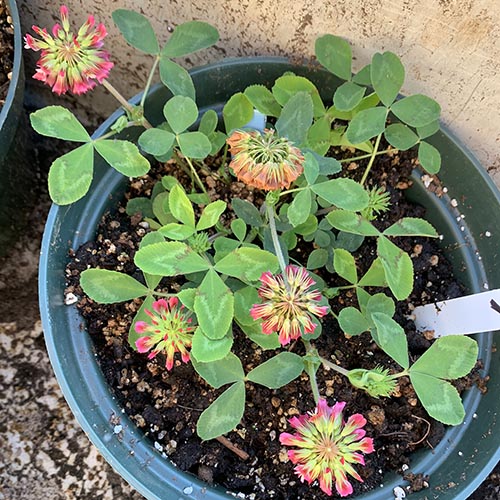
Listen to this Episode:
- From this webpage:
- Find the media player located under the episode picture.
- Click on the green triangle to listen to the audio for this episode.
- From your favorite podcast listening platform:
- Search for “Backyard Ecology.”
Show notes:
Clovers are often suggested for lawn alternatives or for incorporating into our yards to make them more pollinator friendly. Clovers can also play important roles in agriculture either in grazing systems or as cover crops in row cropping systems. In addition, they are a favorite of deer and rabbits. However, most (if not all) of the clovers in these systems and that we typically think of are exotic species. Our native clover species are not nearly as well known.
In this episode of the Backyard Ecology podcast, we talk with Jonathan Kubesh. Jonathan is a PhD student at Virginia Tech University who is studying clovers. Jonathan brings a unique perspective to this topic, because although much of his work focuses on native clovers and native clover conservation, his field of study is in agriculture and agronomy. This allows him to serve as a valuable bridge between the two fields and areas of interest.
While the term “clover” is often loosely used for several different genera of plants, true clovers all belong to the genus Trifolium. In the eastern U.S., we have approximately 10 different species of native clovers in the Trifolium genus. We also have a number of exotic species, such as the familiar white clovers that can be found in our yards and fields.
Many of our native clovers are threatened or endangered. Some of our native clovers are tied to very special soil conditions and habitat types such as the limestone glades in the Nashville, TN area or the shale barrens which can be found in parts of Virginia, Maryland, and Pennsylvania. Other native clover species are tied to disturbance regimes that no longer exist, such as fire or short-term, intensive grazing by bison or deer.
In our conversation, Jonathan and I discuss many different topics. A large part of our conversation is devoted to native clovers. Our discussion about native clovers covers their biology, the conservation efforts surrounding them, how agriculture and horticulture may play a role in those conservation efforts, the importance of keeping good records, and the valuable role of historical collections and herbarium records in helping to discover new populations and in guiding restoration efforts.
Jonathan and I also talk about establishing clover yards and some of the factors that you might want to consider when deciding whether a clover yard is right for you. Like with so many other things in life, there isn’t one single answer that will fit all situations. However, Jonathan does an excellent job of discussing possibilities for different situations and for pointing us towards how to find more specific local help for determining the best option for our own unique situations.
Links:
- Jonathan’s research:
- Other resources recommended by Jonathan:
- Jonathan’s social media pages:
- Jonathan’s email: jakubesch@gmail.com
- Backyard Ecology’s website
- Here’s the episode with Dwayne Estes that we referred to several times
- My email: shannon@backyardecology.net
Episode image:
- Trifolium reflexum growing in Jonathan’s seed trials
- Photo credit: Jonathan Kubesh
Please tell your friends about Backyard Ecology.
(Social media sharing buttons can be found below the footer.)

Backyard Ecology: Exploring Nature in Your Backyard
Nature isn’t just “out there.” It’s all around us, including right outside our doors. Hi, my name is Shannon Trimboli, and I am the host of Backyard Ecology. I live in southcentral Kentucky and am a wildlife biologist, educator, author, beekeeper, and owner of a nursery specializing in plants for pollinators and wildlife conservation. I invite you to join me as we ignite our curiosity and natural wonder, explore our yards and communities, and improve our local pollinator and wildlife habitat. Learn more or subscribe to my email list at www.backyardecology.net.

Leave a Reply to Jeff Cancel reply